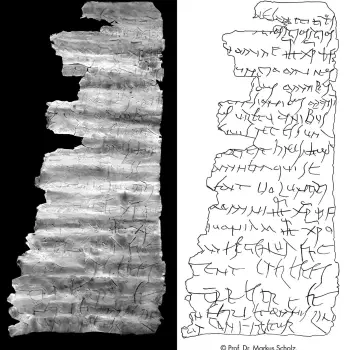 Was Billy Graham Presbyterian or Baptist?
Was Billy Graham Presbyterian or Baptist?
The great evangelist Billy Graham grew up attending a Presbyterian church with his family in North Carolina. And Billy and Ruth Graham raised their children in a Presbyterian church. Yet Billy Graham joined a Southern Baptist Church early in his evangelistic ministry, thereby associating his ministry with Baptists more than with Presbyterians.
Franklin Graham—son of the famed evangelist Billy Graham and strong supporter of Donald Trump as U.S. president—preached an Easter message at the White House Thursday. I read excerpts of it, and I think it was pretty good. But there were a few things he said with which I either disagree or question. The main reason is that Franklin Graham grew up Presbyterian, and his message reflects it.
What Sins Did the Crucified Jesus Bear on the Cross?
Franklin preached, “When Jesus was nailed to the cross, God poured upon his Son all the sins past, all the sins present, all the sins future, and then Jesus shed His blood.” That is Presbyterian teaching, but not all Christians agree with it, including me. I was taught that early in my theological education. But years later I abandoned belief in it mostly because I think there is nothing in the Bible that says this or indicates it. This refers to a disagreement among theologians called Unlimited Atonement versus Limited Atonement.
The New Testament repeatedly says Jesus died for the sins of those who believe in him, and therefore God forgives them of their sins. Jesus dying for our sins means he became our sacrifice for our sins. Franklin Graham said Jesus’s sacrifice of himself was for “all the sins,” thus all sins that all humans commit. This is called theologically Unlimited Atonement. In contrast, I believe Jesus paid that price only for those who believe, thus not for those who don’t believe. To me, if Jesus’s shedding of blood paid the ransom price for Adolf Hitler’s sins, then Hitler is forgiven by God. Not so!
Isaiah the prophet penned the greatest prophecy in the Old Testament, in Isaiah 53, about Jesus’s sacrificial death. He ends it by saying of God’s suffering servant, whom Christians believe refers to Jesus of Nazareth, “he bore the sin of many, and made intercession for the transgressors” (Isaiah 53.12 NRSV). Jesus seems to allude to this text about God’s suffering servant when he said of himself, “For the Son of Man came not be served but to serve, and to give his life in ransom for many” (Mark 10.45). And when Jesus instituted the communion service at the Last Supper he said of the cup of wine representing his impending sacrificial death, “This is my blood of the covenant which is poured out for many” (Mark 14.24). Thus, all three texts says this sacrifice is “for many,” not for all. Who are the many? I think they are believers only.
Franklin Graham also preached that Jesus bore “all the sins past, all the sins present, all the sins future.” We need to be careful with this statement because it has made it easy for some Christians to sin because they think they are already forgiven. Rather, when we Christians sin, we need to humbly ask God to forgive us of those sins (cf. 1 John 1.9). But some Christians have reasoned that this is unnecessary since Jesus bore all our sins. I prefer to think that Jesus bore my sins and leave it there. Then, when I sin as a Christian I need to admit it and ask God, and perhaps others I’ve offended, to forgive me.
Jesus made this clear with his foot washing ceremony during the Last Supper before Easter Sunday. When Peter objected to Jesus washing Peter’s feet, Jesus explained, “Unless I wash you, you have no share with me” (John 13.8). Jesus was using this washing as a metaphor for the salvation was about to provide hours later with his atoning, crucifixion death. Peter then said, “Lord, not my feet only but also my hands and my head!” (v. 9). Jesus then said to him, “One who has bathed does not need to wash, except for the feet, but is entirely clean” (v. 10). He meant that a person who is saved by believing in Jesus atoning death is “entirely clean,” thus forgiven; yet s/he needs the feet washed often, referring to the need for constant repentance of our sins as Christians to receive God’s forgiveness.
Now, the good news about Jesus’s atoning death on the cross, which is the heart of the Christian gospel, is offered to all people everywhere. And they can freely receive this “so great salvation” simply by exercising faith that Jesus truly did die for them, and God raised him from the dead.
God Did Not Abandon Jesus While He Hung on the Cross
Franklin Graham then mentioned in his sermon that Jesus “cried out to His Father, ‘My God, my God, why have you forsaken me?'” Indeed he did. And most Bible readers and church pastors believe Franklin’s explanation of this is correct, that “Jesus became so offensive to His Father. A holy God cannot look upon sin, and for a brief moment, God had to turn his back on his Son.” This cannot be correct for multiple reasons.
When Jesus cried out, “My God, my God, why have you forsaken me?” he was expressing the emotional pain he felt from such intense, physical suffering induced by ghastly crucifixion. But those were not his words, but a quotation of Psalm 22.1. The remainder of the verse says, “Why are you so far from helping me, for the words of my groaning?”
Psalm 22 was authored by King David. It is an expression of feeling distressed without God’s comfort. But that doesn’t necessarily mean God is not present. For, David later says to God in this psalm, “Do not be far from me, for trouble is near and there is no one to help me. … O LORD, do not be far away” (vv. 11, 19). How could David ask God not to be be far away from him if David had first indicated that God indeed was far away, even having forsaken him? Rather, David in verse 1 was expressing how he felt, not necessarily how things really were, and David indicates this later in this psalm.
Did God forsake Jesus, that is, abandon him, on the cross because God abhors the sins Jesus was bearing? I think not. For David also says of God, “For he did not despise or abhor the affliction of the afflicted; he did not hide his face from me, but heard when I cried to him” (Psalm 22.24). What David says here indicates that he did not mean in verse 1 that God had abandoned him, which would contradict this.
Finally, the next psalm, Psalm 23 authored by David also, has been the most favored biblical psalm by Bible readers. David says to God midway through it, “Even though I walk through the darkest valley, I fear no evil; for you are with me” (Psalm 23.4). Jesus said, “And the one who sent me is with me; he has not left me alone” (John 8.29). And Jesus said to his disciples concerning his crucifixion, (2) “you will be scattered, … and you will leave me alone. Yet I am not alone, because the Father is with me” (John 16.32).
[See also “Did God Forsake Jesus on the Cross?” I believe Billy Graham was perhaps the greatest man of God in the twentieth century. I was one of his many friends, and he endorsed my first book. Yet see my, “Critique of a Billy Graham Easter Message.”]















